Unit 10 Then and now 复习课件(82张PPT)
文档属性
| 名称 | Unit 10 Then and now 复习课件(82张PPT) |
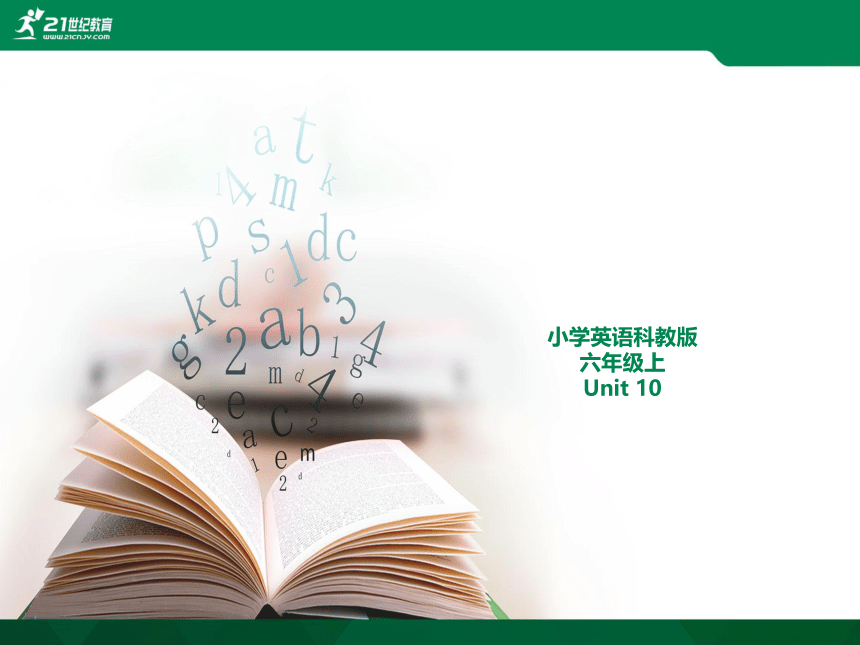
|
|
| 格式 | zip | ||
| 文件大小 | 6.5MB | ||
| 资源类型 | 试卷 | ||
| 版本资源 | 教科版(广州) | ||
| 科目 | 英语 | ||
| 更新时间 | 2020-12-14 16:41:50 | ||
图片预览

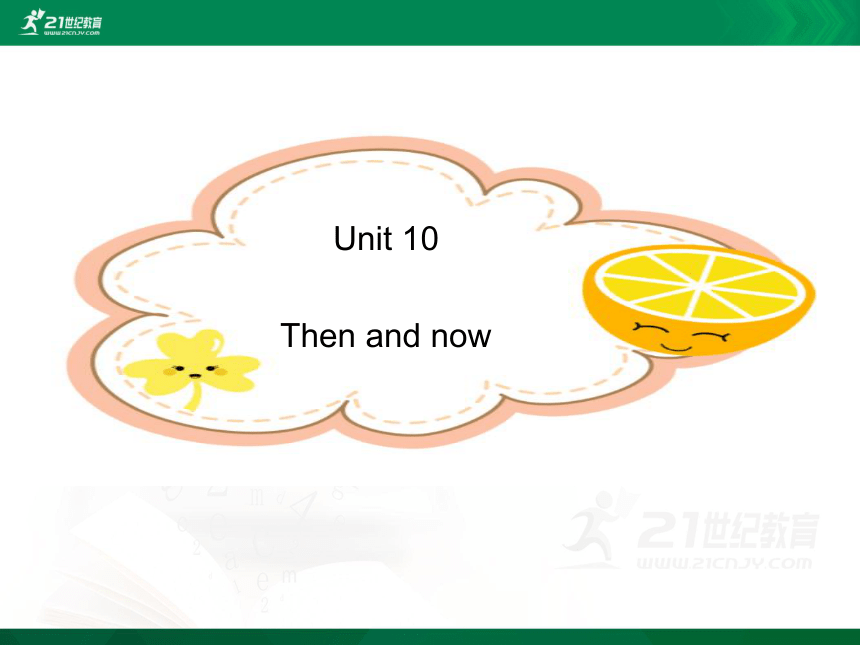
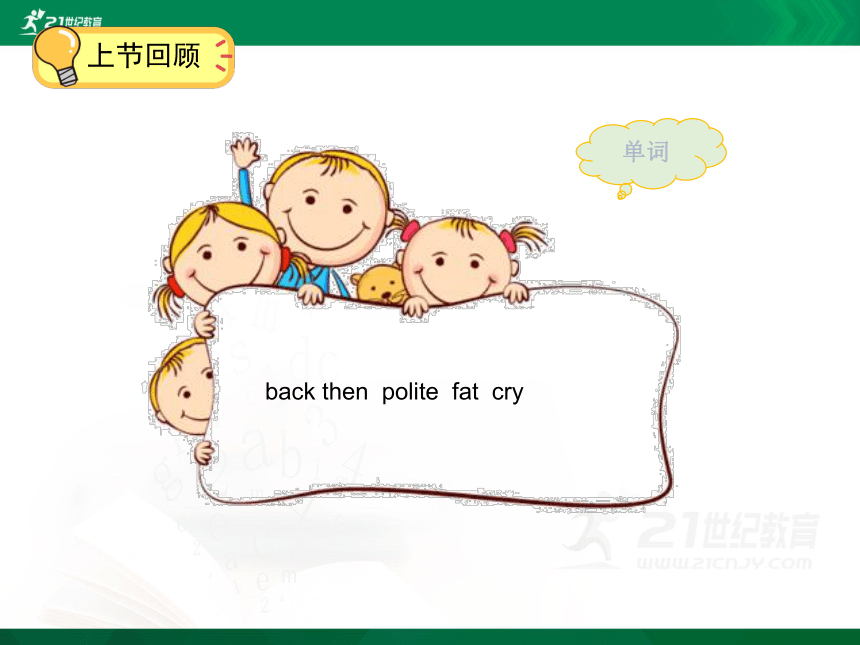
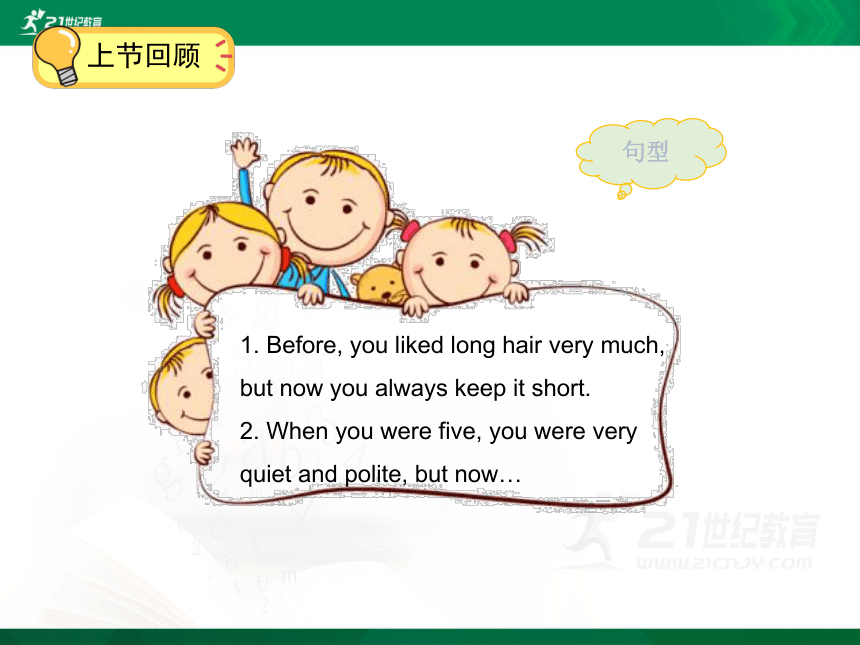
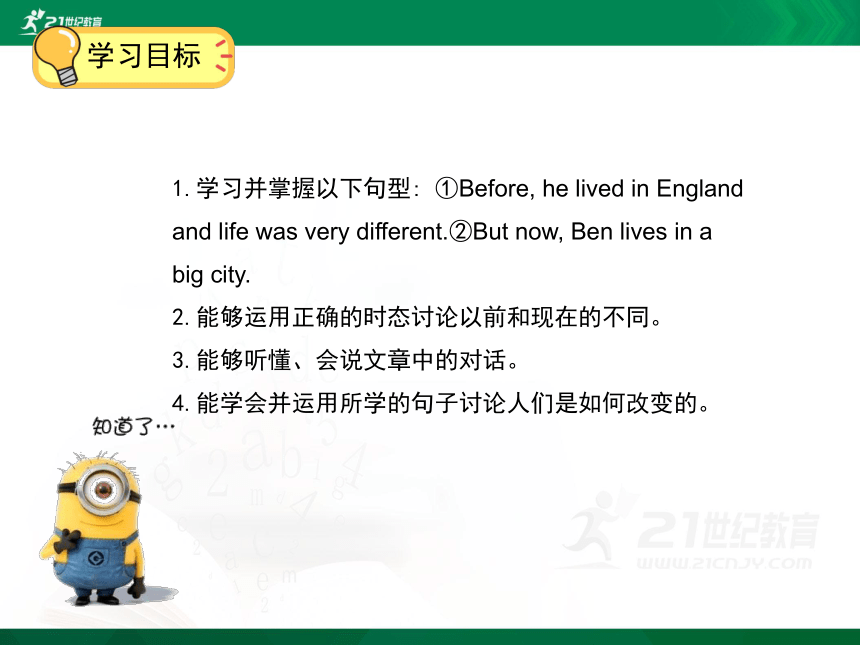
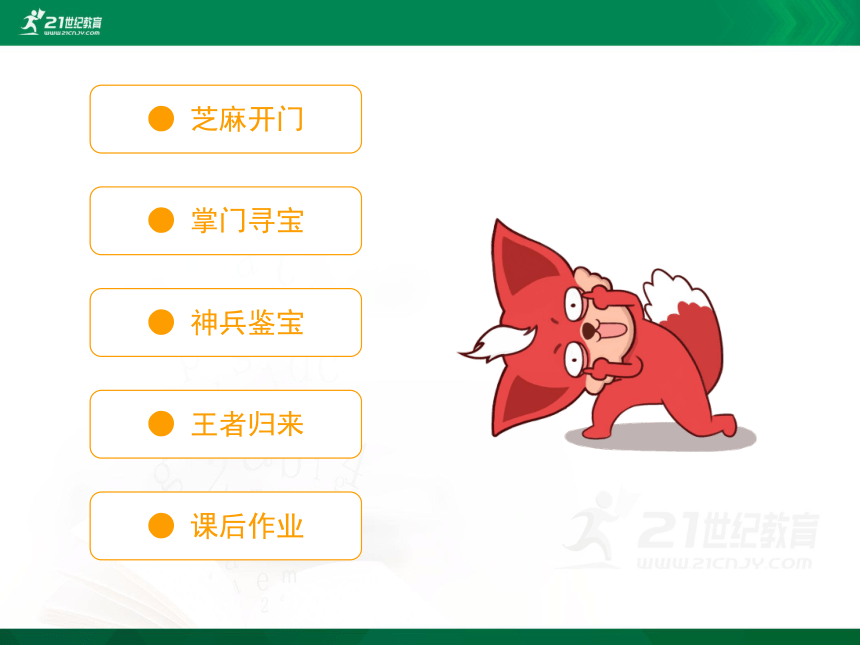

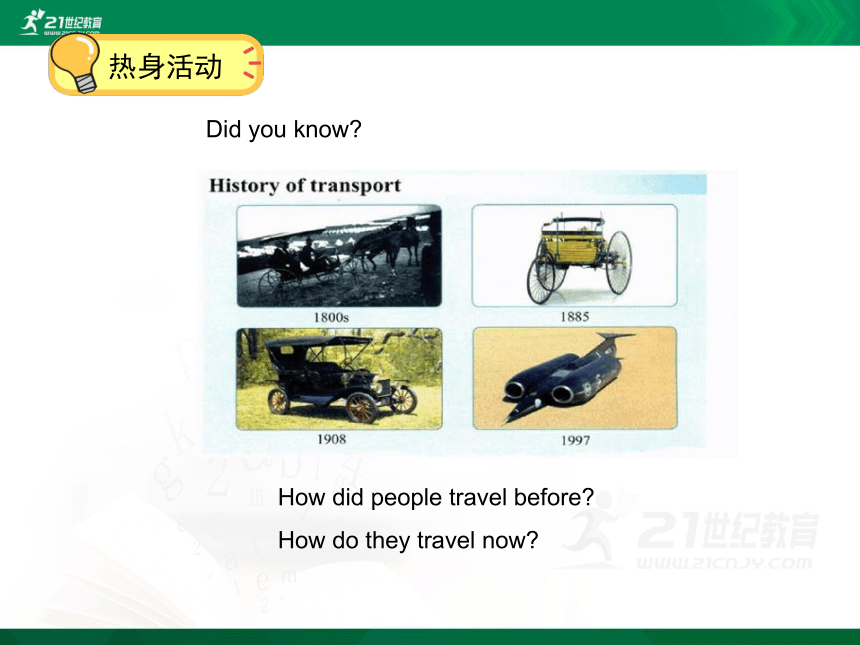
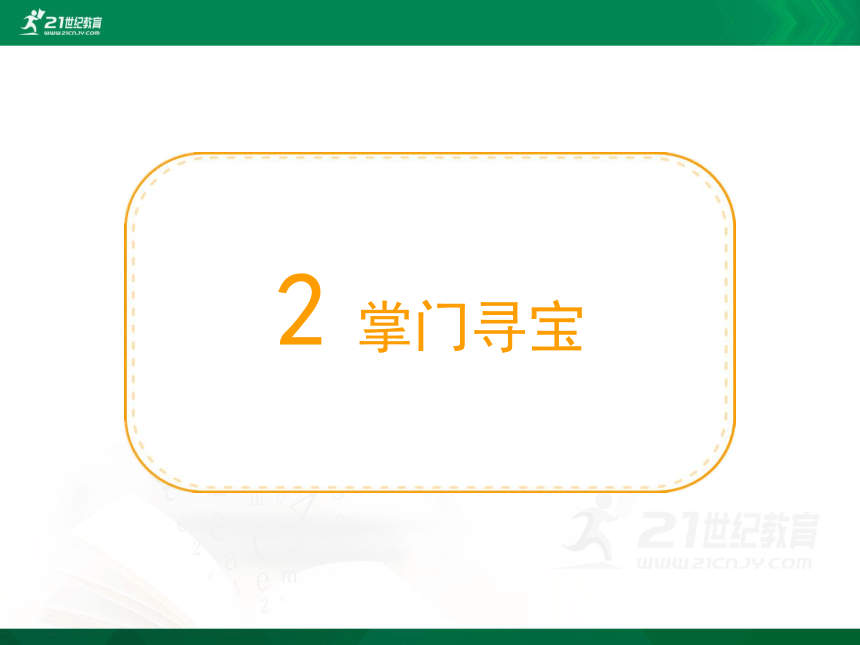
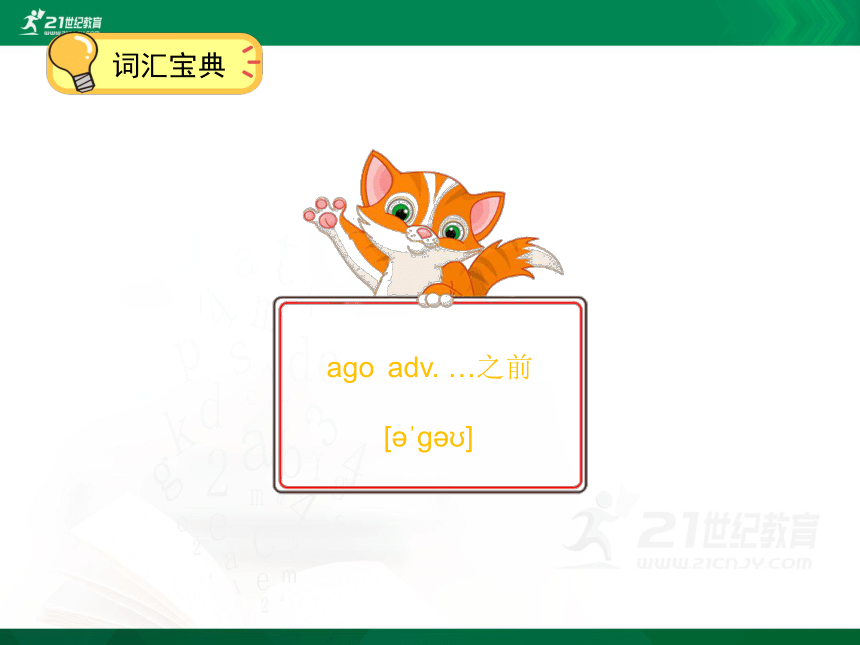
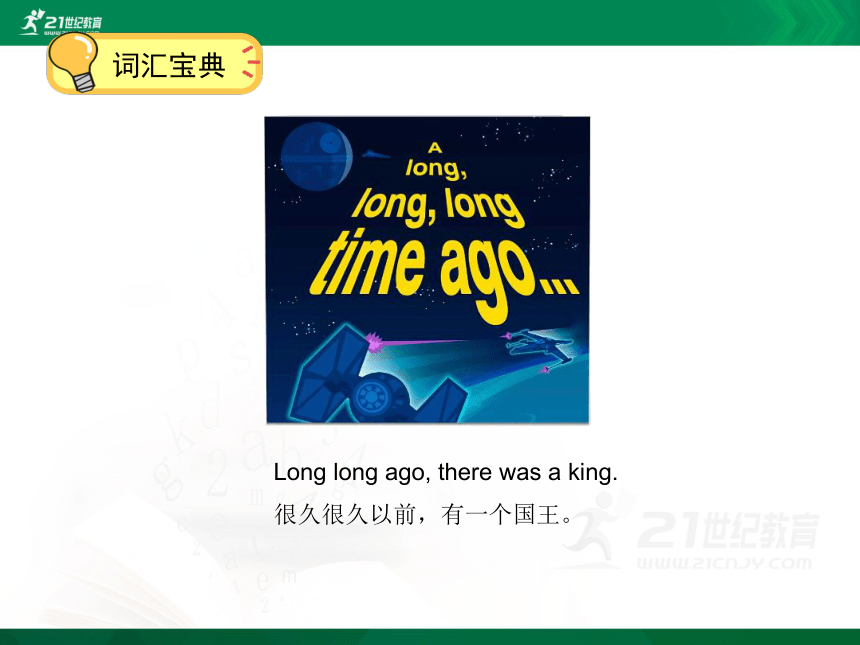
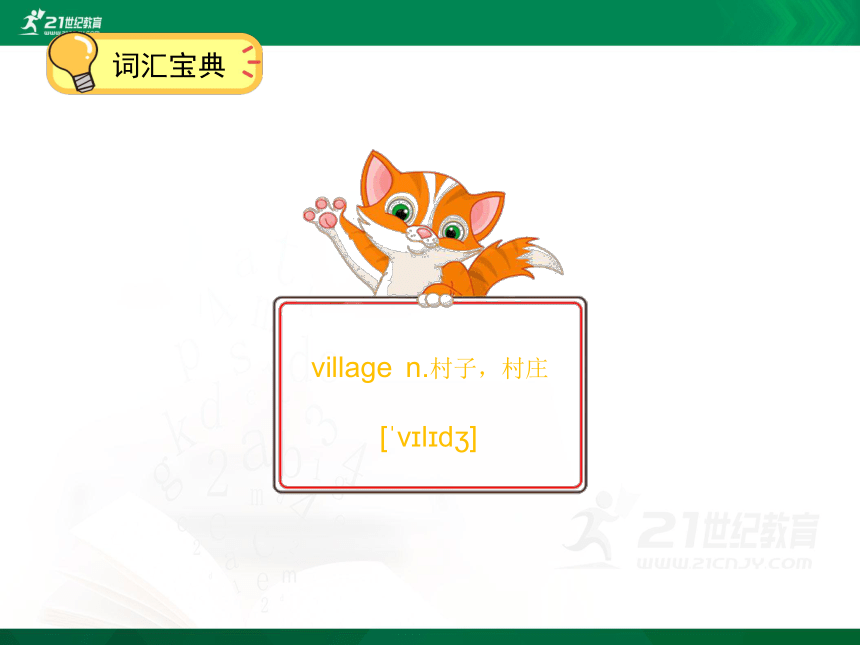
文档简介
(共82张PPT)
小学英语科教版
六年级上
Unit
10
Unit
10
Then
and
now
上节回顾
back
then
polite
fat
cry
单词
上节回顾
1.
Before,
you
liked
long
hair
very
much,
but
now
you
always
keep
it
short.
2.
When
you
were
five,
you
were
very
quiet
and
polite,
but
now…
句型
学习目标
1.学习并掌握以下句型:
①Before,
he
lived
in
England
and
life
was
very
different.②But
now,
Ben
lives
in
a
big
city.
2.能够运用正确的时态讨论以前和现在的不同。
3.能够听懂、会说文章中的对话。
4.能学会并运用所学的句子讨论人们是如何改变的。
●
芝麻开门
●
掌门寻宝
●
神兵鉴宝
●
王者归来
●
课后作业
1
芝麻开门
热身活动
How
did
people
travel
before?
How
do
they
travel
now?
Did
you
know?
2
掌门寻宝
词汇宝典
ago
adv.
…之前
[??ɡ??]
Long
long
ago,
there
was
a
king.
很久很久以前,有一个国王。
词汇宝典
词汇宝典
village
n.村子,村庄
[?v?l?d?]
I
like
to
live
in
a
village,
because
it
is
beautiful.
我喜欢在村庄生活,因为那里很漂亮。
词汇宝典
词汇宝典
nearby
prep
&
adv.附近
[?n???ba?]
My
home
is
nearby,
and
I
can
walk
home.
我家就在附近,我可以走回去。
词汇宝典
nearby
词汇宝典
office
n.办公室
[??f?s]
The
office
is
very
beautiful.
这间办公室很漂亮。
词汇宝典
词汇宝典
store
n.商店
[st??(r)]
There
are
many
stores
in
the
big
cities.
大城市里有许多商店。
词汇宝典
department
store
百货公司
练一练
ago
nearby
office
store
village
村庄
…以前
附近
办公室
商店
练一练
ago
nearby
office
store
village
村庄
…以前
附近
办公室
商店
短语宝典
三年前
在农场上
多于
遥远
乘公交
three
years
ago
on
the
farm
more
than
far
away
take
the
bus
找妈妈
three
years
ago
on
the
farm
more
than
far
away
take
the
bus
三年前
乘公交
遥远
在农场上
多于
找妈妈
three
years
ago
on
the
farm
more
than
far
away
take
the
bus
三年前
乘公交
遥远
在农场上
多于
3
神兵鉴宝
文中探宝
三年前,过去时态标志
come
to
do
sth:来做某事
在那以前
不同
在乡村
在农场工作
每天步行去学校
当他在英格兰的时候
要点迷津
live居住
live
in
China住在中国
live
in
England住在英格兰
live
in
a
small
village住在一个小村庄
live
here住在这
live
in+地点名词
live+地点副词
要点迷津
there
be过去式
1.There
was+单数可数名词/不可数名词+其他。
There
was
a
cat
on
the
chair
just
now.刚刚椅子上有一只猫。
There
was
some
milk
in
the
bottle
yesterday.昨天瓶子里有一些牛奶。
2.There
were+复数可数名词+其他。
There
were
only
150
pupils
in
Ben’s
school
before.以前Ben的学校只有150个小学生。
肯定句:
要点迷津
there
be过去式
1.There
was
not+单数可数名词/不可数名词+其他。
There
was
not
a
cat
on
the
chair
just
now.刚刚椅子上没有一只猫。
There
was
not
any
milk
in
the
bottle
yesterday.昨天瓶子里没有一些牛奶。
2.There
were
not+复数可数名词+其他。
There
were
not
150
pupils
in
Ben’s
school
before.以前Ben的学校没有150个小学生。
否定句:
要点迷津
there
be过去式
1.
Was
there+单数可数名词/不可数名词+其他?
Was
there
a
cat
on
the
chair
just
now?刚刚椅子上有一只猫吗?
Was
there
any
milk
in
the
bottle
yesterday?昨天瓶子里有一些牛奶吗?
2.Were
there+复数可数名词+其他?
Were
there
150
pupils
in
Ben’s
school
before?以前Ben的学校有150个小学生吗?
一般疑问句:
学以致用
1.用适当的be动词填空。
1.There
_____
a
pencil
in
the
pencil-box.
2.There
_____
two
cats
in
my
house
before.
3.There
_____
any
water
in
the
bottle
just
now.
4.____
there
any
chicken
in
the
fridge
now?
5.There
_____
500
students
in
my
school
last
year.
6.There
_____
four
people
in
my
family.
7.____
there
any
people
in
the
classroom
just
now?
学以致用
解析:
1.There
_____
a
pencil
in
the
pencil-box.
2.There
_____
two
cats
in
my
house
before.
3.There
_____
any
water
in
the
bottle
just
now.
4.____
there
any
chicken
in
the
fridge
now?
5.There
_____
500
students
in
my
school
last
year.
6.There
_____
four
people
in
my
family.
7.____
there
any
people
in
the
classroom
just
now?
is
were
wasn’t
Was
were
are
Were
要点迷津
nearby附近
1.作形容词,位于be动词后,或名词前。
His
home
is
nearby.他的家在附近。
I
need
to
go
to
a
nearby
hospital.我需要去附近的一家医院。
2.作副词,位于动词后。
He
lives
nearby.他住在附近。
要点迷津
walk
to
school
walk
to(动词短语)=on
foot(介词短语)
walk
to
school
=
go
to
school
on
foot.
Before,
he
walked
to
school
every
day.
=Before,
he
went
to
school
on
foot
every
day.
以前,他每天步行去学校。
对on
foot提问用how。
要点迷津
take
a
bus
=
by
bus
乘公交
take
a
car
=
by
car
坐小汽车
take
a
plane
=by
plane
坐飞机
take
a
train
=
by
train
坐火车
take
a
subway
=
by
subway
坐地铁
ride
a
bike
=
by
bike
骑自行车
补充
动词短语
介词短语
学以致用
1.My
father
went
to
work
by
car
before.
(对划线部分提问)
_______________________________________?
2.Ben
went
to
school
by
bus
last
year.(改为同义句)
_______________________________________.
3.I
went
to
Beijing
by
plane
last
weekend.(改为一般疑问句)
_______________________________________?
答案解析
1.My
father
went
to
work
by
car
before.
(对划线部分提问)
_______________________________________?
2.Ben
went
to
school
by
bus
last
year.(改为同义句)
_______________________________________.
3.I
went
to
Beijing
by
plane
last
weekend.(改为一般疑问句)
_______________________________________?
How
did
your
father
go
to
work
before
Ben
took
a
bus
to
school
last
year
Did
you
go
to
Beijing
by
plane
last
weekend
文中探宝
1000多小学生
遥远
乘公交
许多事做
他英格兰村庄宁静的生活
想念
要点迷津
There
be
表示某地有某物,有时可以和have结构互换。
The
city
has
many
people,
cars
and
tall
buildings.
=There
are
many
people,
cars
and
tall
buildings
in
the
city.
这个城市有许多人,汽车和高楼房。
there
be
&
have
要点迷津
1.far
away:遥远,表距离,在句中作状语或表语,有时away可以省略。
The
town
my
friend
lives
is
far
(away).我朋友住的城镇很远。
2.far
away
from:离…远,表距离,作状语或表语,away可省略。
The
school
is
far
(away)
from
my
home.学校离我家很远。
far
away遥远
要点迷津
1.see
sb
do
sth:看见某人做过某事,强调结果。
I
saw
her
help
an
old
man
cross
the
road.我看见她帮助一个过了马路。
2.see
sb
doing
sth:看见某人正在做某事,强调过程。
I
saw
him
playing
football.我看见他正在踢足球。
see看见
回答问题
1.When
did
Ben
come
to
China?
2.Where
did
he
live
in
England?
3.How
did
Ben
go
to
school
before?
4.Where
do
many
people
work
in
the
city?
5.Why
does
Ben
like
the
city?
回答问题
1.He
came
to
China
three
years
ago.
2.He
lived
in
a
small
village
in
England.
3.He
walked
to
school
before.
4.They
go
to
walk
in
modern
office
building
and
department
stores.
5.Because
there
are
many
things
to
do.
金句演练
1.三年前,Ben和他的父母来到中国居住。
__________________________________________.
金句演练
1.三年前,Ben和他的父母来到中国居住。
__________________________________________.
Three
years
ago,
Ben
came
to
live
in
China
with
his
parents
金句演练
2.他的家很近,所以他每天走路去学校。
__________________________________________.
金句演练
2.他的家很近,所以他每天走路去学校。
__________________________________________.
His
home
was
nearby
so
he
walked
to
school
every
day
金句演练
3.但是现在,他住在一个大城市里。
__________________________________________.
金句演练
3.但是现在,他住在一个大城市里。
__________________________________________.
But
now,
he
lives
in
a
big
city
金句演练
4.但是有时,他想念他英格兰村庄宁静的生活。
__________________________________________.
金句演练
4.但是有时,他想念他英格兰村庄宁静的生活。
__________________________________________.
But
sometimes,
he
misses
the
quiet
life
of
his
English
village
要点迷津
1.定义:表示过去发生的事情,过去存在的状态,过去经常发生的事情。常和过去的时间搭配。
2.结构:
主语+was/were+其他。
主语+could+动词原形+其他。
主语+动词过去式+其他。
一般过去时
一般现在时
1.定义:表示经常性,习惯性的动作或状态。常与表示频率的时间状语连用。
2.结构:
主语+am/is/are+其他。
主语+can+动词原形+其他。
主语+动词原形/动词三单+其他。
学以致用
1.Mike
____
to
work
by
bus
every
day.
A.
goes
B.
go
C.
went
学以致用
1.Mike
____
to
work
by
bus
every
day.
A.
goes
B.
go
C.
went
【答案】:A
【解析】:因为every
day是每天,标志着一般现在时,主语是三单,所以选A。
学以致用
2.____
you
___
to
Beijing
last
month?
A.
Did,
went
B.
Do,
go
C.
Did,
go
学以致用
2.____
you
___
to
Beijing
last
month?
A.
Did,
went
B.
Do,
go
C.
Did,
go
【答案】:C
【解析】:last
month标志着过去式,所以助动词用did,助动词后面跟动词原形,所以选C。
学以致用
3.She
___
long
hair
when
she
was
10
years
old.
A.
has
B.
have
C.
had
学以致用
3.She
___
long
hair
when
she
was
10
years
old.
A.
has
B.
have
C.
had
【答案】:C
【解析】:从when
she
was
10
years
old看出这
是过去式的句子,所以选C。
4
王者归来
译一译
1.在那以前,他住在英格兰。
_____________________________________.
2.Most
of
the
people
worked
on
farms.
_____________________________________。
3.这有许多事情做,他有很多朋友。
_____________________________________.
译一译
1.在那以前,他住在英格兰。
_____________________________________.
2.Most
of
the
people
worked
on
farms.
_____________________________________。
3.这有许多事情做,他有很多朋友。
_____________________________________.
Before
then,
he
lived
in
England
大多数人在农场上工作
There
are
many
things
to
do
and
he
has
lots
of
friends
译一译
4.Before
then,
life
____
very
different.
A.
was
B.
were
C.
is
译一译
4.Before
then,
life
____
very
different.
A.
was
B.
were
C.
is
【答案】:A
【解析】:before
then是在那以前,标志着一般过去时,life是不可数名词,所以选A。
far
away
three
years
ago
take
the
bus
on
the
farm
more
than
1.Before,he
lived
in…
2.But
now,
he
lives
in…
能够分别用一般过去时态和一般现在时态表达某人或某事物从过去到现在的变化。
词汇
ago
nearby
office
store
village
短语
句型
表达
知识总结
5
课后作业
课后作业
用所给词的适当形式填空。
1.Five
years
ago,
Mary
______
(can)
draw.
2.Tom
usually
______
(walk)
to
school.
3.My
mother
________
(watch)
TV
every
evening.
4.Old
bush
________
(visit)
China
again
last
month.
5.When
I
was
five,
I
___________
(not
like)
to
go
to
school.
6.______
he
____
(take)
the
bus
to
school
before?
7.There
_____
(be)
a
football
match
yesterday
afternoon.
课后作业
【答案解析】:
1.could:
five
years
ago标志着过去式。
2.walks:
usually标志着一般现在时,主语是三单,动词用三单。
3.watches:
every
evening标志着一般现在时,主语是三单,动词用三单.
4.visited:
last
month标志着过去式.
5.didn’t
like:
when
I
was
five标志着过去式,not表示否定.
6.Did,
take:
before标志着过去式。
7.was:
yesterday
afternoon标志着过去式。
课后作业
1.His
home
is
____,
so
he
walks
to
school
every
day.
A.
far
away
B.
nearby
C.
near
to
课后作业
【答案】:B
【解析】:根据后面走路去学校课看出他的家离学校近,所以选B。
课后作业
2.Ben
goes
to
school
____
now.
A.
by
bus
B.
by
a
bus
C.
take
the
bus
课后作业
【答案】:A
【解析】:考查交通方式的表达,乘公交是by
bus。
课后作业
3.It
is
famous
____
its
fish
and
rice.
A.
of
B.
to
C.
for
课后作业
【答案】:C
【解析】:考查短语be
famous
for,以…而出名。
课后作业
far
away,
office,
most,
ago,
village,
nearby,
department
store
1.My
home
is
______,
so
I
can
go
to
school
on
foot.
But
my
father
works
________,
he
has
to
go
to
work
by
car.
2.A
________
life
is
a
healthy
life.
3.Ten
years
______,I
was
a
little
boy.
4._____
of
my
family
like
eating
fish.
5.Many
people
go
to
work
in
that
tall
______
building.
6.There
is
a
big
______________
in
this
city.
We
can
buy
all
kinds
of
things
here.
课后作业
far
away,
office,
most,
ago,
village,
nearby,
department
store
1.My
home
is
______,
so
I
can
go
to
school
on
foot.
But
my
father
works
________,
he
has
to
go
to
work
by
car.
2.A
________
life
is
a
healthy
life.
3.Ten
years
______,I
was
a
little
boy.
4._____
of
my
family
like
eating
fish.
5.Many
people
go
to
work
in
that
tall
______
building.
6.There
is
a
big
______________
in
this
city.
We
can
buy
all
kinds
of
things
here.
nearby
far
away
village
ago
Most
office
department
store
课后作业
4.My
father
went
to
Beijing
by
train
before.(对划线部分提问)
__________________________________?
课后作业
【答案】:How
did
your
father
go
to
Beijing
before?
【解析】:考查特殊疑问句,划线部分表示的是方式,所以用How来提问,时态为过去式,借助did,第一人称改为第二人称,went变回原形,其它照写。
课后作业
课后作业
√
×
√
√
×
①
②
③
④
⑤
Thank
You!
谢谢
21世纪教育网(www.21cnjy.com)
中小学教育资源网站
有大把高质量资料?一线教师?一线教研员?
欢迎加入21世纪教育网教师合作团队!!月薪过万不是梦!!
详情请看:
https://www.21cnjy.com/help/help_extract.php
小学英语科教版
六年级上
Unit
10
Unit
10
Then
and
now
上节回顾
back
then
polite
fat
cry
单词
上节回顾
1.
Before,
you
liked
long
hair
very
much,
but
now
you
always
keep
it
short.
2.
When
you
were
five,
you
were
very
quiet
and
polite,
but
now…
句型
学习目标
1.学习并掌握以下句型:
①Before,
he
lived
in
England
and
life
was
very
different.②But
now,
Ben
lives
in
a
big
city.
2.能够运用正确的时态讨论以前和现在的不同。
3.能够听懂、会说文章中的对话。
4.能学会并运用所学的句子讨论人们是如何改变的。
●
芝麻开门
●
掌门寻宝
●
神兵鉴宝
●
王者归来
●
课后作业
1
芝麻开门
热身活动
How
did
people
travel
before?
How
do
they
travel
now?
Did
you
know?
2
掌门寻宝
词汇宝典
ago
adv.
…之前
[??ɡ??]
Long
long
ago,
there
was
a
king.
很久很久以前,有一个国王。
词汇宝典
词汇宝典
village
n.村子,村庄
[?v?l?d?]
I
like
to
live
in
a
village,
because
it
is
beautiful.
我喜欢在村庄生活,因为那里很漂亮。
词汇宝典
词汇宝典
nearby
prep
&
adv.附近
[?n???ba?]
My
home
is
nearby,
and
I
can
walk
home.
我家就在附近,我可以走回去。
词汇宝典
nearby
词汇宝典
office
n.办公室
[??f?s]
The
office
is
very
beautiful.
这间办公室很漂亮。
词汇宝典
词汇宝典
store
n.商店
[st??(r)]
There
are
many
stores
in
the
big
cities.
大城市里有许多商店。
词汇宝典
department
store
百货公司
练一练
ago
nearby
office
store
village
村庄
…以前
附近
办公室
商店
练一练
ago
nearby
office
store
village
村庄
…以前
附近
办公室
商店
短语宝典
三年前
在农场上
多于
遥远
乘公交
three
years
ago
on
the
farm
more
than
far
away
take
the
bus
找妈妈
three
years
ago
on
the
farm
more
than
far
away
take
the
bus
三年前
乘公交
遥远
在农场上
多于
找妈妈
three
years
ago
on
the
farm
more
than
far
away
take
the
bus
三年前
乘公交
遥远
在农场上
多于
3
神兵鉴宝
文中探宝
三年前,过去时态标志
come
to
do
sth:来做某事
在那以前
不同
在乡村
在农场工作
每天步行去学校
当他在英格兰的时候
要点迷津
live居住
live
in
China住在中国
live
in
England住在英格兰
live
in
a
small
village住在一个小村庄
live
here住在这
live
in+地点名词
live+地点副词
要点迷津
there
be过去式
1.There
was+单数可数名词/不可数名词+其他。
There
was
a
cat
on
the
chair
just
now.刚刚椅子上有一只猫。
There
was
some
milk
in
the
bottle
yesterday.昨天瓶子里有一些牛奶。
2.There
were+复数可数名词+其他。
There
were
only
150
pupils
in
Ben’s
school
before.以前Ben的学校只有150个小学生。
肯定句:
要点迷津
there
be过去式
1.There
was
not+单数可数名词/不可数名词+其他。
There
was
not
a
cat
on
the
chair
just
now.刚刚椅子上没有一只猫。
There
was
not
any
milk
in
the
bottle
yesterday.昨天瓶子里没有一些牛奶。
2.There
were
not+复数可数名词+其他。
There
were
not
150
pupils
in
Ben’s
school
before.以前Ben的学校没有150个小学生。
否定句:
要点迷津
there
be过去式
1.
Was
there+单数可数名词/不可数名词+其他?
Was
there
a
cat
on
the
chair
just
now?刚刚椅子上有一只猫吗?
Was
there
any
milk
in
the
bottle
yesterday?昨天瓶子里有一些牛奶吗?
2.Were
there+复数可数名词+其他?
Were
there
150
pupils
in
Ben’s
school
before?以前Ben的学校有150个小学生吗?
一般疑问句:
学以致用
1.用适当的be动词填空。
1.There
_____
a
pencil
in
the
pencil-box.
2.There
_____
two
cats
in
my
house
before.
3.There
_____
any
water
in
the
bottle
just
now.
4.____
there
any
chicken
in
the
fridge
now?
5.There
_____
500
students
in
my
school
last
year.
6.There
_____
four
people
in
my
family.
7.____
there
any
people
in
the
classroom
just
now?
学以致用
解析:
1.There
_____
a
pencil
in
the
pencil-box.
2.There
_____
two
cats
in
my
house
before.
3.There
_____
any
water
in
the
bottle
just
now.
4.____
there
any
chicken
in
the
fridge
now?
5.There
_____
500
students
in
my
school
last
year.
6.There
_____
four
people
in
my
family.
7.____
there
any
people
in
the
classroom
just
now?
is
were
wasn’t
Was
were
are
Were
要点迷津
nearby附近
1.作形容词,位于be动词后,或名词前。
His
home
is
nearby.他的家在附近。
I
need
to
go
to
a
nearby
hospital.我需要去附近的一家医院。
2.作副词,位于动词后。
He
lives
nearby.他住在附近。
要点迷津
walk
to
school
walk
to(动词短语)=on
foot(介词短语)
walk
to
school
=
go
to
school
on
foot.
Before,
he
walked
to
school
every
day.
=Before,
he
went
to
school
on
foot
every
day.
以前,他每天步行去学校。
对on
foot提问用how。
要点迷津
take
a
bus
=
by
bus
乘公交
take
a
car
=
by
car
坐小汽车
take
a
plane
=by
plane
坐飞机
take
a
train
=
by
train
坐火车
take
a
subway
=
by
subway
坐地铁
ride
a
bike
=
by
bike
骑自行车
补充
动词短语
介词短语
学以致用
1.My
father
went
to
work
by
car
before.
(对划线部分提问)
_______________________________________?
2.Ben
went
to
school
by
bus
last
year.(改为同义句)
_______________________________________.
3.I
went
to
Beijing
by
plane
last
weekend.(改为一般疑问句)
_______________________________________?
答案解析
1.My
father
went
to
work
by
car
before.
(对划线部分提问)
_______________________________________?
2.Ben
went
to
school
by
bus
last
year.(改为同义句)
_______________________________________.
3.I
went
to
Beijing
by
plane
last
weekend.(改为一般疑问句)
_______________________________________?
How
did
your
father
go
to
work
before
Ben
took
a
bus
to
school
last
year
Did
you
go
to
Beijing
by
plane
last
weekend
文中探宝
1000多小学生
遥远
乘公交
许多事做
他英格兰村庄宁静的生活
想念
要点迷津
There
be
表示某地有某物,有时可以和have结构互换。
The
city
has
many
people,
cars
and
tall
buildings.
=There
are
many
people,
cars
and
tall
buildings
in
the
city.
这个城市有许多人,汽车和高楼房。
there
be
&
have
要点迷津
1.far
away:遥远,表距离,在句中作状语或表语,有时away可以省略。
The
town
my
friend
lives
is
far
(away).我朋友住的城镇很远。
2.far
away
from:离…远,表距离,作状语或表语,away可省略。
The
school
is
far
(away)
from
my
home.学校离我家很远。
far
away遥远
要点迷津
1.see
sb
do
sth:看见某人做过某事,强调结果。
I
saw
her
help
an
old
man
cross
the
road.我看见她帮助一个过了马路。
2.see
sb
doing
sth:看见某人正在做某事,强调过程。
I
saw
him
playing
football.我看见他正在踢足球。
see看见
回答问题
1.When
did
Ben
come
to
China?
2.Where
did
he
live
in
England?
3.How
did
Ben
go
to
school
before?
4.Where
do
many
people
work
in
the
city?
5.Why
does
Ben
like
the
city?
回答问题
1.He
came
to
China
three
years
ago.
2.He
lived
in
a
small
village
in
England.
3.He
walked
to
school
before.
4.They
go
to
walk
in
modern
office
building
and
department
stores.
5.Because
there
are
many
things
to
do.
金句演练
1.三年前,Ben和他的父母来到中国居住。
__________________________________________.
金句演练
1.三年前,Ben和他的父母来到中国居住。
__________________________________________.
Three
years
ago,
Ben
came
to
live
in
China
with
his
parents
金句演练
2.他的家很近,所以他每天走路去学校。
__________________________________________.
金句演练
2.他的家很近,所以他每天走路去学校。
__________________________________________.
His
home
was
nearby
so
he
walked
to
school
every
day
金句演练
3.但是现在,他住在一个大城市里。
__________________________________________.
金句演练
3.但是现在,他住在一个大城市里。
__________________________________________.
But
now,
he
lives
in
a
big
city
金句演练
4.但是有时,他想念他英格兰村庄宁静的生活。
__________________________________________.
金句演练
4.但是有时,他想念他英格兰村庄宁静的生活。
__________________________________________.
But
sometimes,
he
misses
the
quiet
life
of
his
English
village
要点迷津
1.定义:表示过去发生的事情,过去存在的状态,过去经常发生的事情。常和过去的时间搭配。
2.结构:
主语+was/were+其他。
主语+could+动词原形+其他。
主语+动词过去式+其他。
一般过去时
一般现在时
1.定义:表示经常性,习惯性的动作或状态。常与表示频率的时间状语连用。
2.结构:
主语+am/is/are+其他。
主语+can+动词原形+其他。
主语+动词原形/动词三单+其他。
学以致用
1.Mike
____
to
work
by
bus
every
day.
A.
goes
B.
go
C.
went
学以致用
1.Mike
____
to
work
by
bus
every
day.
A.
goes
B.
go
C.
went
【答案】:A
【解析】:因为every
day是每天,标志着一般现在时,主语是三单,所以选A。
学以致用
2.____
you
___
to
Beijing
last
month?
A.
Did,
went
B.
Do,
go
C.
Did,
go
学以致用
2.____
you
___
to
Beijing
last
month?
A.
Did,
went
B.
Do,
go
C.
Did,
go
【答案】:C
【解析】:last
month标志着过去式,所以助动词用did,助动词后面跟动词原形,所以选C。
学以致用
3.She
___
long
hair
when
she
was
10
years
old.
A.
has
B.
have
C.
had
学以致用
3.She
___
long
hair
when
she
was
10
years
old.
A.
has
B.
have
C.
had
【答案】:C
【解析】:从when
she
was
10
years
old看出这
是过去式的句子,所以选C。
4
王者归来
译一译
1.在那以前,他住在英格兰。
_____________________________________.
2.Most
of
the
people
worked
on
farms.
_____________________________________。
3.这有许多事情做,他有很多朋友。
_____________________________________.
译一译
1.在那以前,他住在英格兰。
_____________________________________.
2.Most
of
the
people
worked
on
farms.
_____________________________________。
3.这有许多事情做,他有很多朋友。
_____________________________________.
Before
then,
he
lived
in
England
大多数人在农场上工作
There
are
many
things
to
do
and
he
has
lots
of
friends
译一译
4.Before
then,
life
____
very
different.
A.
was
B.
were
C.
is
译一译
4.Before
then,
life
____
very
different.
A.
was
B.
were
C.
is
【答案】:A
【解析】:before
then是在那以前,标志着一般过去时,life是不可数名词,所以选A。
far
away
three
years
ago
take
the
bus
on
the
farm
more
than
1.Before,he
lived
in…
2.But
now,
he
lives
in…
能够分别用一般过去时态和一般现在时态表达某人或某事物从过去到现在的变化。
词汇
ago
nearby
office
store
village
短语
句型
表达
知识总结
5
课后作业
课后作业
用所给词的适当形式填空。
1.Five
years
ago,
Mary
______
(can)
draw.
2.Tom
usually
______
(walk)
to
school.
3.My
mother
________
(watch)
TV
every
evening.
4.Old
bush
________
(visit)
China
again
last
month.
5.When
I
was
five,
I
___________
(not
like)
to
go
to
school.
6.______
he
____
(take)
the
bus
to
school
before?
7.There
_____
(be)
a
football
match
yesterday
afternoon.
课后作业
【答案解析】:
1.could:
five
years
ago标志着过去式。
2.walks:
usually标志着一般现在时,主语是三单,动词用三单。
3.watches:
every
evening标志着一般现在时,主语是三单,动词用三单.
4.visited:
last
month标志着过去式.
5.didn’t
like:
when
I
was
five标志着过去式,not表示否定.
6.Did,
take:
before标志着过去式。
7.was:
yesterday
afternoon标志着过去式。
课后作业
1.His
home
is
____,
so
he
walks
to
school
every
day.
A.
far
away
B.
nearby
C.
near
to
课后作业
【答案】:B
【解析】:根据后面走路去学校课看出他的家离学校近,所以选B。
课后作业
2.Ben
goes
to
school
____
now.
A.
by
bus
B.
by
a
bus
C.
take
the
bus
课后作业
【答案】:A
【解析】:考查交通方式的表达,乘公交是by
bus。
课后作业
3.It
is
famous
____
its
fish
and
rice.
A.
of
B.
to
C.
for
课后作业
【答案】:C
【解析】:考查短语be
famous
for,以…而出名。
课后作业
far
away,
office,
most,
ago,
village,
nearby,
department
store
1.My
home
is
______,
so
I
can
go
to
school
on
foot.
But
my
father
works
________,
he
has
to
go
to
work
by
car.
2.A
________
life
is
a
healthy
life.
3.Ten
years
______,I
was
a
little
boy.
4._____
of
my
family
like
eating
fish.
5.Many
people
go
to
work
in
that
tall
______
building.
6.There
is
a
big
______________
in
this
city.
We
can
buy
all
kinds
of
things
here.
课后作业
far
away,
office,
most,
ago,
village,
nearby,
department
store
1.My
home
is
______,
so
I
can
go
to
school
on
foot.
But
my
father
works
________,
he
has
to
go
to
work
by
car.
2.A
________
life
is
a
healthy
life.
3.Ten
years
______,I
was
a
little
boy.
4._____
of
my
family
like
eating
fish.
5.Many
people
go
to
work
in
that
tall
______
building.
6.There
is
a
big
______________
in
this
city.
We
can
buy
all
kinds
of
things
here.
nearby
far
away
village
ago
Most
office
department
store
课后作业
4.My
father
went
to
Beijing
by
train
before.(对划线部分提问)
__________________________________?
课后作业
【答案】:How
did
your
father
go
to
Beijing
before?
【解析】:考查特殊疑问句,划线部分表示的是方式,所以用How来提问,时态为过去式,借助did,第一人称改为第二人称,went变回原形,其它照写。
课后作业
课后作业
√
×
√
√
×
①
②
③
④
⑤
Thank
You!
谢谢
21世纪教育网(www.21cnjy.com)
中小学教育资源网站
有大把高质量资料?一线教师?一线教研员?
欢迎加入21世纪教育网教师合作团队!!月薪过万不是梦!!
详情请看:
https://www.21cnjy.com/help/help_extract.php
同课章节目录
- Module 1 Country life
- Unit 1 What are those farmers doing?
- Unit 2 A country life is a healthy life
- Module 2 City life
- Unit 3 Where are you from?
- Unit 4 I like the city very much
- Module 3 Health
- Unit 5 What's the matter with you?
- Unit 6 The secret of good health
- Module 4 Past experiences
- Unit 7 What did you do yesterday?
- Unit 8 A trip to Hong Kong
- Module 5 Changes
- Unit 9 Was I a good girl back then?
- Unit 10 Then and now
- Module 6 Festivals
- Unit 11 I like the Spring Festival best
- Unit 12 Other festival in China
- Unit 12 Christmas(旧版)
- Module 7 Let's look back
